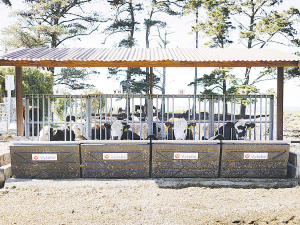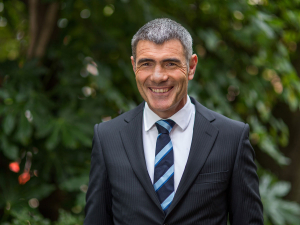Farmers and scientists are using the latest technology to measure how efficiently New Zealand beef cattle convert feed into liveweight and their greenhouse gas emissions in a cutting- edge trial on a North Canterbury farm.
Cattle of all breeds eat variable amounts each day, some more, some less than their counterparts, while gaining the same weight.
Now research teams are hoping to use the information from the trial to develop genetic tools that farmers can use to produce animals that feed more efficiently and emit less methane, without reducing the animal’s productivity.
The trial at Te Mania Angus stud near Parnassus has already sparked interest from scientists and farmers in Australia who recently visited the farm.
Geneticists from Beef + Lamb New Zealand’s Informing New Zealand Beef programme, scientists from AgResearch and Te Mania Angus stud are working together on the project.
Head of genetics at B+LNZ Dr Jason Archer says the goal of the trial is to develop new traits specifically for the New Zealand beef industry so farmers can produce efficient cattle with a light environmental footprint and run productive and profitable farms.
“The feed efficiency of an animal is important to farmers because they’re facing rising costs behind the farm gate. An animal that can grow or produce more for the same amount of feed eaten is a real advantage for the farmer. At the same time, we are keen to find animals that produce less methane.
Read More
“We aim to create two breeding values - the measure of an animal’s genetic potential to pass on specific traits to its offspring - one for feed efficiency and another for methane emissions per kilo of feed.
“In sheep, we have shown that we can breed for animals that produce less methane for every mouthful of feed. The goal in this trial is to try and identify those cattle that can do both – produce less methane per kilogram of feed and grow faster per kilogram of feed. That way we can get a double shot of lower methane and better animal performance.”
Director at Te Mania Angus Will Wilding says feed intake is measured by feeding silage in a bin that sits on load bar scales.
“Basically the Vytelle Sense system is a big tub of silage sitting on scales. Only one animal can feed at any one time. While the animal eats, the system reads its NAIT identification tag, records which specific animal is eating, and weighs feed before, during and after feeding.
“The system feeds data back to Vytelle in Canada and they collate the data to tell you exactly how much each animal has eaten.
“When the animals have a drink, they are weighed on scales, providing data for their daily weight gain.”
AgResearch then use Portable Accumulation Chambers to measure methane emissions during the trial, he says.
“Farmers will benefit from the trial because they will be able to extract more value from inputs by having a more accurate feed efficiency Estimated Breeding Value (EBV) as a tool in their toolbox.”



















